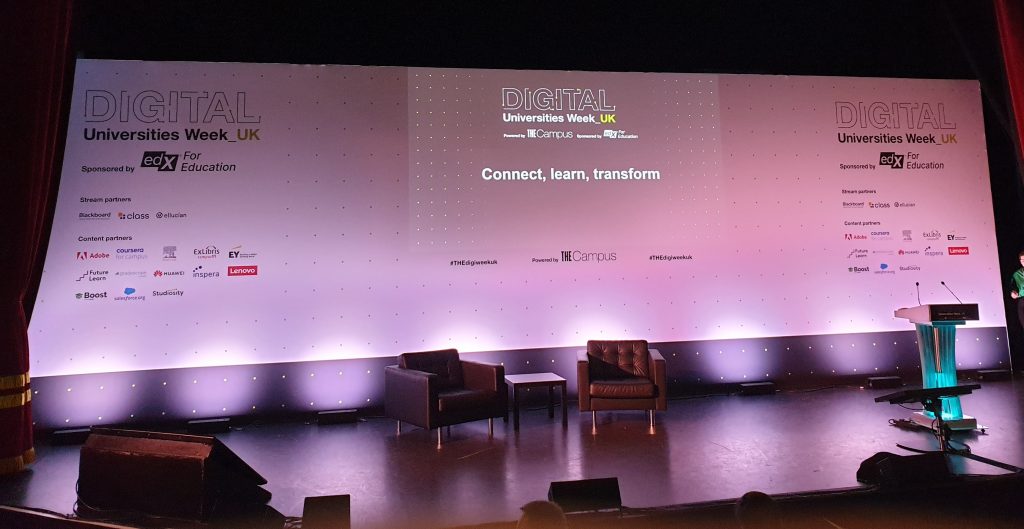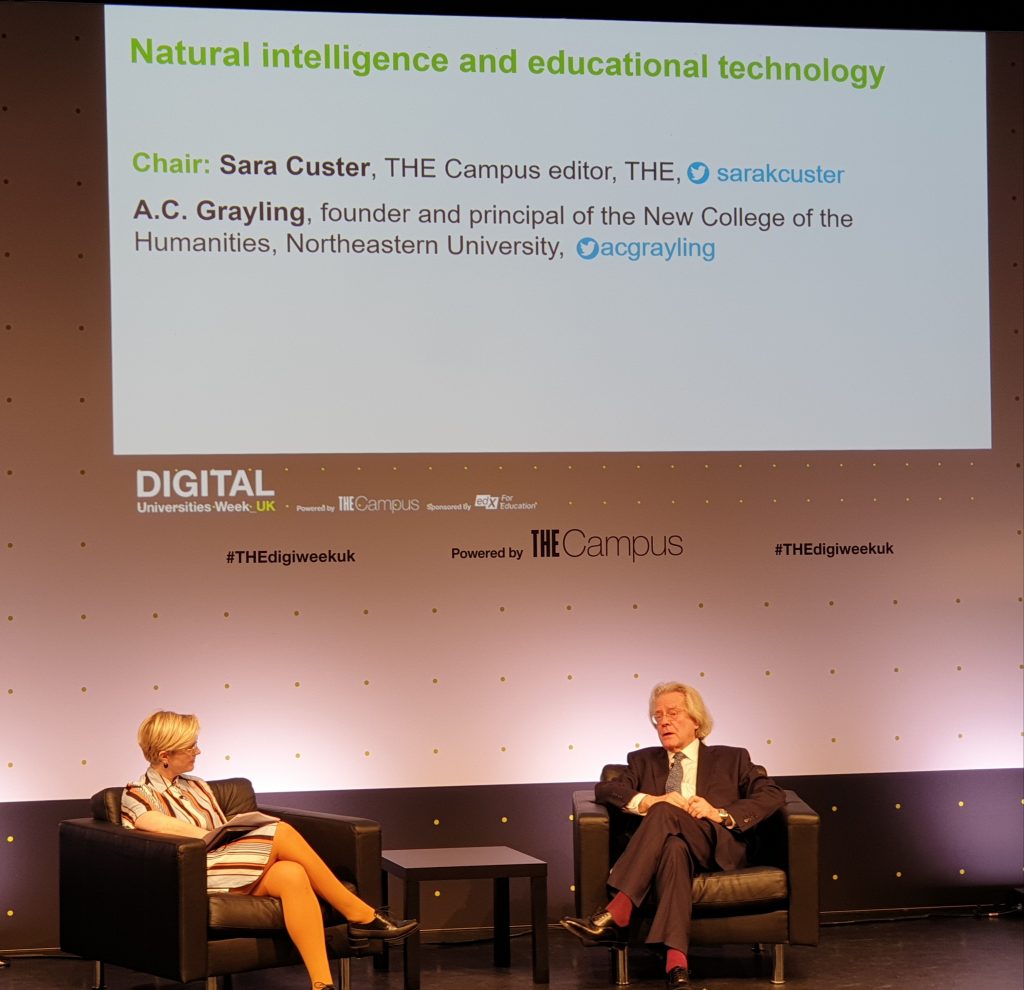Reflections from THE Digital Universities Week UK: Connect, learn, transform.
Development Monthly | #7 March 2022 | Event Report | Reflections from THE Digital Universities Week UK: Connect, learn, transform.
Dr Ella Popper
AUA
We are all acutely aware of the rise of digital technology in the higher education (HE) sector, the use of which has accelerated since the pivot to online learning during the COVID-19 pandemic. There is an increasing urgency in the sector to digitally transform, perhaps with an eye on government moves to shake up HE provision with the potential of more flexible, modular, stackable learning. Yet, there is unhelpful rhetoric from the government who, on the one hand, is invested in growing digital skills and innovation, and on the other, want universities to return to in-person learning, or ‘normal’ – whatever that is…
The digital transformation of HE will inevitably impact the roles and activities of professional staff. I attended THE Digital Universities Week to understand what is happening in this area and inform the membership of the conversations in the broader context in which they work. This event took place over five days, so I cannot do justice to it in 1500 words. Hopefully, this reflection will provide some context for the tensions within the sector and provoke ideas and discussion about what involvement professional staff have, or may have, in the digital transformation of HE.
The decline of the traditional university?
Throughout the event, there was a palpable sense of angst about the future of the university. The philosopher, Founder and Principal of the New College of the Humanities, A. C. Grayling, compared universities to medieval castles that became redundant because of the technology of the day; “Ask yourself, will universities survive in their traditional model?” It’s a serious question, he argues.
“The idea that there will always be student demand for face-to-face teaching cannot be relied upon, just because there is the demand now…In 10, 15, 20 years, we will be dealing with a different generation…and the great faculties of higher education will become like the medieval castle….”

Professor Agarwal, Founder of Edx and a former Director at MIT, supported this statement, arguing that even now, some students don’t want a whole degree, whilst others want to do a degree over time studying between their employment. In addition, more people are looking for shorter programmes to accelerate their careers. This flexibility mirrors the fact that our careers are no longer linear as it becomes increasingly rare to work in the same role or progress in the same field for your whole life. Therefore, the notion that we only study for an undergraduate degree for three years from the age of 18 has also disappeared. The question is, how should the sector respond?
Arguably, universities have been operating in crisis mode since the pandemic, and now the challenge is moving from a reactive to a proactive position. Whilst the UK university model is held in high regard worldwide, Pallavi Malhotra, Director at Huawei, argues they are slow to move, meaning there is a danger they will never keep up with the needs of an ever-changing workforce. We could debate at great length whether the purpose of higher education is to serve economic needs and whether universities ought to be too concerned with disrupting the traditional HE model. Should UK universities accept, as one speaker put it, that their USP is to be able to award degrees and other providers can do everything else? After all, undergoing a digital transformation would cost universities tens of millions of pounds – “they aren’t big enough to drive a digital transformation, nor niche enough to focus down”, posits Matt Robb, European Education Practice Leader at EY. However, the consensus formed was that if universities cannot drive the digital transformation bus, they at least need to be on it or get left behind.
Getting on the bus: A whole institution approach to digital transformation
The past two years have had a significant impact on how we work and our health and well-being. We have also demonstrated adaptability and resilience in the face of unprecedented change. Such change usually happens over a generation, but we have experienced that change squashed into two years. During this time, assumptions have been made about the propensity and capability of students and staff to study and work digitally. Unquestionably, without people, there are no universities. People are the lifeblood of our higher education providers, whether they be students, academic or professional staff. So how are universities ensuring that they are not leaving anyone behind as they move from crisis mode to planning for long-term digital working?

A common theme emerging from the case studies presented at the event was the need for a solid digital infrastructure where people can get the right, timely support and build their confidence in navigating the digital landscape. Creating the right infrastructure for the University of Greenwich has been ten years in the making and is still evolving. In their strategy refresh, Greenwich is focusing on the digital principles intended to drive every area of the University’s operations to help everyone pull in the same direction. Based on feedback from the previous iterations of their strategy, Greenwich identified two key challenges; staff feel they cannot keep up with the pace of change, and the organisational structure is not suitable to support change. As a result, their current focus is restructuring the teams responsible for digital to ensure the right resources are in the right place, enhancing digital competency across all staff and developing a digital baseline for recruitment and personal development planning. The drive to embed enhanced digital capability across all aspects of an institution is central to creating a digital culture for the University College of Estates Management. They require all staff to experience being an online learner through a bespoke online module for staff. There is also an emphasis on sharing practice in digital working, including sharing best practices internally and from the sector and the adoption of ‘digital buddies’ to help staff build digital literacy and confidence.
We heard how institutions promote the Jisc capability tool to help staff identify their strengths and areas for development across the six areas of Jisc’s digital capability framework. Yet there was an acknowledgement that there needs to be a digital levelling up in higher education institutions. Everyone, regardless of their role, has something to contribute to the digital transformation of HE. Moreover, there was an admission that more focus is needed to support professional staff developing their digital capabilities. For example, professional staff are often on the frontline dealing with students who need support to access digital spaces, so staff need to talk through those issues with students. Equally, the introduction of new systems and processes and the use of data are increasingly critical to the work that we all do. Yet, professional staff remain underrepresented in the area of digital transformation.
What next for professional staff?
We all have a part to play in the digital transformation of HE and in getting this right by developing a culture of digital excellence. On the one hand, the AUA has a responsibility to learn how best to keep members up to date about the developments in the HE digital landscape and the impact of these changes. On the other hand, HE professionals themselves need to work out how their roles might develop as a result of digital transformation, what skills and experiences they have to share or to develop, to stay ahead and maximise the benefits of the changes. We need to be open to the possibility of digital transformation in HE, even though it is an area that many of us are only just beginning to understand.
Resources
Jisc. (2019). Professional services staff in education profile Six elements of digital capabilities. Retrieved from https://repository.jisc.ac.uk/7389/1/BDCP-PSS-Profile-300419.pdf
Please note that Jisc are currently reviewing their role profiles. It is vital that professional staff voices are heard and can shape this update. You can complete a survey to support the review and you have until 29th April to contribute https://jisc.onlinesurveys.ac.uk/jisc-role-profiles-review
Digital Discovery Tool and the Jisc Digital Capability Framework. The Discovery tool is a supportive online tool that can help you reflect on your current digital skills experience and confidence, mapped against the Jisc framework. Completing the tool not only gives you a personalised map of your capabilities, it also identifies ways to support your development and provides links to further relevant resources, enabling you to create your own digital development plan. You will be able to access this tool if your institution subscribes to this service.
Events
Jisc Connect More, 4-6 May 2022, online. Free to Jisc members https://www.jisc.ac.uk/events/connect-more-4-may-2022/about
Join the discussion @The_AUA #Develop or scroll to the bottom for comments
Also in this issue of Development Monthly

0 comments on “Reflections from THE Digital Universities Week UK: Connect, learn, transform.”